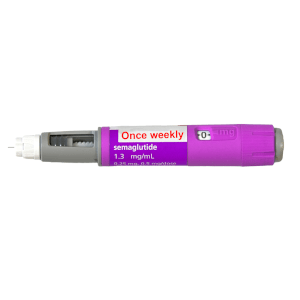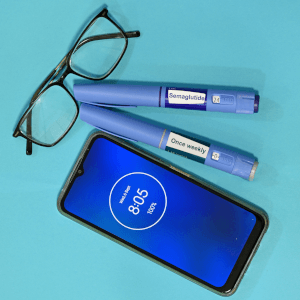 You may have heard about Ozempic babies but not know what they are. What has happened is that there has been an uptick in people taking Ozempic, a diabetes medication also used as a weight loss medication, reporting unplanned pregnancies.
You may have heard about Ozempic babies but not know what they are. What has happened is that there has been an uptick in people taking Ozempic, a diabetes medication also used as a weight loss medication, reporting unplanned pregnancies.
Since Ozempic hasn’t been fully researched, there are a lot of side effects, both known and unknown, associated with the drug, which many take to lose weight. For example, in addition to unplanned pregnancies, Ozempic users have reported side effects such as gastroparesis, ileus and gallbladder disease.
While the reports of unexpectedly getting pregnant while taking Ozempic are currently anecdotal, there a lot of anecdotes – although no official study has been done yet on the relationship between Ozempic and fertility.
What Is Ozempic?
The active ingredient in Ozempic, semaglutide, is a medication which is used to treat type 2 diabetes. It is also used to manage weight on a long-term basis. Ozempic is taken via injection.
As a diabetes medication, Ozempic lowers blood sugar in three ways:
- It helps the pancreas to produce extra insulin when blood sugar levels are high
- It helps by preventing the liver from making and then releasing excess sugar
- It slows the rate of food in leaving the stomach
The drug does these things by mimicking the incretin glucagon-like peptide-1, enhancing the growth of insulin-producing and releasing pancreatic beta cells, and inhibiting the production of glucagon, a hormone which increases the release of carbohydrates from the liver and the synthesis of new glucose.
GLP-1 agonist drugs like Ozempic are also used as weight loss drugs since they reduce the intake of food by lowering one’s appetite as well as slowing digestion down, which helps to reduce body fat and prevent weight gain.
How Ozempic and Similar Drugs Can Interfere With Birth Control
While no long-term studies have been done on this, it appears as though Ozempic may be able to disrupt the efficacy of birth control by affecting its absorption.
According to a board certified endocrinologist quoted by Healthline, GLP-1 agonists such as Ozempic slow down the emptying of the stomach, so they can affect how medications and food are absorbed.
This, according to the doctor, causes birth control pills to end up not being consistently absorbed, leading to a failure of birth control pills.
The doctor advises that those who do not wish to have unexpected pregnancies should utilize alternative birth control methods when using GLP-1 agonist drugs.
Does Ozempic Increase Fertility?
You may be wondering, “does Ozempic affect fertility?” No long-term studies have been done on the relationship between Ozempic and fertility.
However, it is possible that weight loss – one of Ozempic’s side effects, may result in an increase in fertility.
Being obese or overweight can have a negative impact upon fertility by leading to hormonal imbalances or problems with menstrual and ovulation disorders like polycystic ovary syndrome, one of the leading reasons for infertility.
According to a bariatric surgeon quoted by Jefferson Health, the primary reason obese people become infertile is imbalanced levels of hormones. According to the doctor, having excess weight in the form of too much body fat causes the levels of estrogen to rise, leading to the ovaries having difficulty functioning correctly. Women whose body mass index is over 27 are actually three times more likely than those with a normal weight to be infertile due to being not as likely to ovulate.
In addition, obesity can affect the hormonal balance which regulates one’s menstrual cycle.
So, when it comes to trying to treat hormonal imbalances which can lead to infertility, losing weight can help. Losing body weight can improve blood sugar, reduce insulin resistance and restore hormonal balance, improving fertility.
Novo Nordisk, the manufacturer of Ozempic says it lacks clinical data regarding Ozempic’s effect on fertility treatments.
The Effect of Ozempic During Pregnancy
 Pregnant women may be wondering what the effect of Ozempic is during pregnancy. The best idea is to avoid Ozempic while pregnant.
Pregnant women may be wondering what the effect of Ozempic is during pregnancy. The best idea is to avoid Ozempic while pregnant.
The warning labels of Ozempic, as well as Wegovy, warn against pregnant women taking these drugs. Ozempic’s label advises to stop taking the drug at least two months before pregnancy because semaglutide has a long washout period.
According to Ozempic’s label, animal reproduction studies have shown that there are possible risks to fetuses regarding exposure to semaglutide.
According to the drug’s label, embryofetal mortality, alterations to growth, structural abnormalities and early pregnancy losses were observed in animal reproduction studies where animals were given semaglutide.
There are studies in progress to see the impact of Ozempic and Wegovy on pregnant individuals, but there is nothing conclusive yet.
Because Ozempic can be dangerous to your health in general, it’s a good idea to avoid any risks while pregnant.
Should You Take Ozempic When Trying to Get Pregnant?
It is probably a bad idea to take Ozempic while pregnant because of the limited existing research on the subject.
If you are considering getting pregnant, you should discuss weight goals, health and medications with a doctor. A decision to stop, continue or start a drug like Ozempic should end up being based upon a careful assessment of potential risks and benefits.
GLP-1 drugs like Ozempic are not usually recommended to women who are attempting to become pregnant. These drugs are intended to manage weight and blood sugar levels. The impact of these drugs upon developing pregnancies isn’t understood well.
Other Dangers of Ozempic
Users of Ozempic have reported several side effects, some of them serious, including:
Gastroparesis
Gastroparesis is also known as stomach paralysis. This is a serious condition with serious complications, including:
- Severe dehydration
- Malnutrition
- Bezoars – solid masses of food in the stomach which can prevent food from moving into the small intestine
- Unpredictable changes in blood sugar
- A lower quality of life
Semaglutide users who talked with CNN reported things like vomiting multiple times per day, even after ceasing use of the medication, as well as needing treatment for dehydration.
Ileus or Bowel Obstruction
Ileus is when the intestine is incapable of pushing waste and food out of the body.
The large intestine absorbs water and utilizes strong, wavelike motions to push food and waste down to the anus so it can be expelled. When the intestine ceases making these wavelike motions, ileus happens.
A bowel obstruction is when something physical is preventing the contents of the digestive tract from moving.
Ileus can lead to complications such as:
- Holes in the intestinal wall
- Tissue death
- Abdominal cavity infection
Bowel obstructions can also lead to the above complications.
Gallbladder Disease
Users of GLP-1 agonist drugs like Ozempic have reported gallbladder diseases such as cholecystitis or cholelithiasis. Some users of semaglutide have reported the need for gallbladder removal surgery.
Pancreatic Cancer
Some users of GLP-1 agonist drugs like Ozempic have reported pancreatic cancer.
Pulmonary Embolism or Deep Vein Thrombosis
Some users of GLP-1 agonist drugs like Ozempic have reported pulmonary embolism or deep vein thrombosis, conditions associated with blood clots.
Pulmonary Aspiration
Since Ozempic can prevent the stomach from emptying, it may increase the risk of pulmonary aspiration during surgery, which is when the contents of the stomach make their way into the lungs. This can lead to pneumonia or death from asphyxiation.
When to File a Lawsuit
 If you or a loved one have suffered from any of the following conditions after taking Ozempic or another GLP-1 agonist drug like Wegovy, you may be eligible for financial compensation in a lawsuit:
If you or a loved one have suffered from any of the following conditions after taking Ozempic or another GLP-1 agonist drug like Wegovy, you may be eligible for financial compensation in a lawsuit:
- Gastroparesis
- Bowel obstruction
- Ileus
- Gallbladder disease
- The need for gallbladder removal surgery
- Deep vein thrombosis
- Pulmonary embolism
- Pancreatic cancer
- Other gastrointestinal injuries
- Suicide
You may be eligible for financial compensation in a lawsuit if you or a loved one developed any of the above conditions after taking:
- Ozempic
- Rybelsus
- Wegovy
- Trulicity
- Mounjaro
If you qualify for a lawsuit, we can help you recover financial compensation for medical bills, lost wages, loss of earning capacity, pain and suffering, wrongful death and more.
We have been representing victims of dangerous drugs since 1990 and have recovered hundreds of millions of dollars for our clients. We have the expertise and resources to recover the most money possible for you in your Ozempic case.
If you can’t afford to have your side effects treated, we can get you to doctors who will treat your Ozempic side effects on a lien, meaning you won’t be charged for treatment until your case is over.
We will not charge any fee to handle your Ozempic case until and unless we recover financial compensation on your behalf. The only fee you’ll ever owe is a percentage of any compensation we recover on your behalf, so you’ll never owe any upfront fees or out-of-pocket fees for us to handle your Ozempic case.
Contact us today for a free consultation if you or a loved one was injured by Ozempic or another GLP-1 agonist drug.

